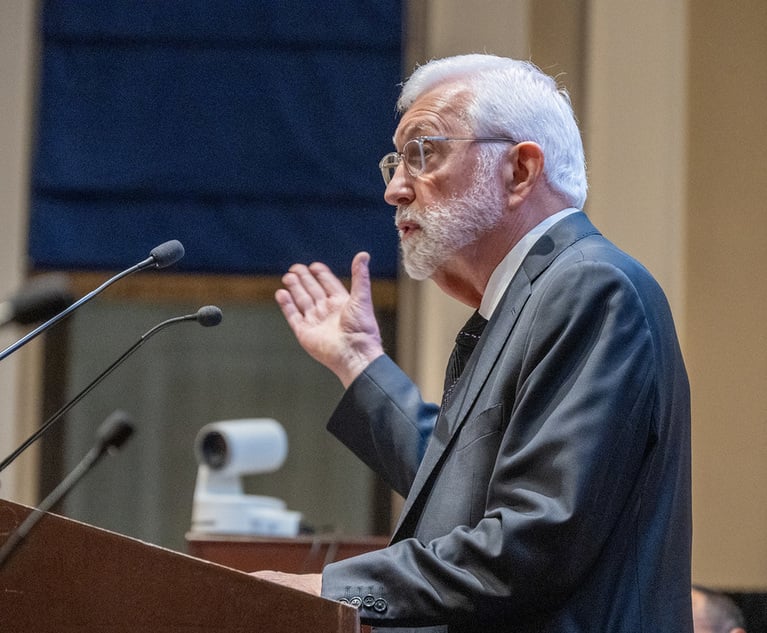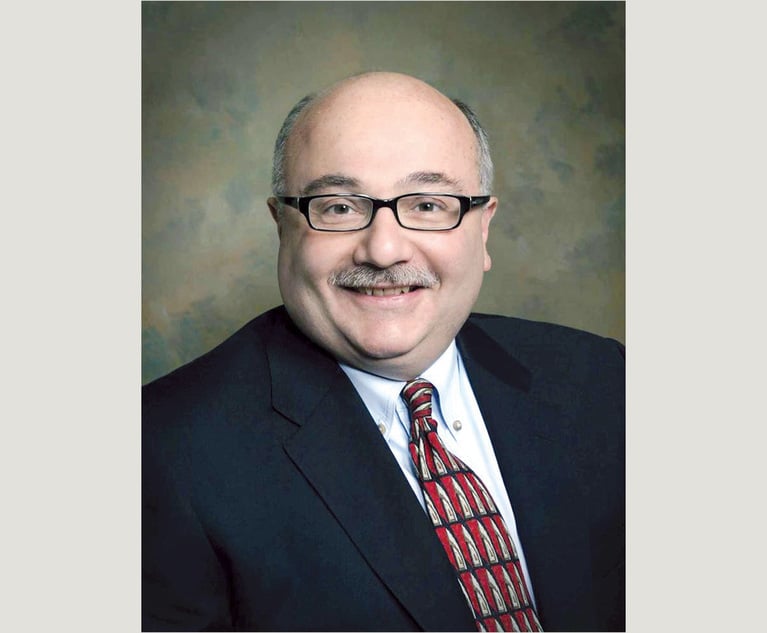 Shira Forman
Shira FormanDefending Depositions: An Active Task That Requires Careful Planning, Preparation
In her Litigation 101 column, Shira Forman writes: As compared with the strategic task of taking a deposition, defending a deposition is often regarded as simple—nothing more than holding the witness's hand, objecting sparingly, and making sure everything goes as smoothly as possible.
August 14, 2018 at 01:13 PM
5 minute read
As compared with the strategic task of taking a deposition, defending a deposition is often regarded as simple—nothing more than holding the witness's hand, objecting sparingly, and making sure everything goes as smoothly as possible. And, in fact, the very first time I assisted in defending a client's deposition, my main job as the second chair was to squeeze the witness's hand for reassurance whenever she nervously invoked her fifth amendment right against self-incrimination—quite literally an exercise in hand-holding. That memorable first experience notwithstanding, defending a deposition can—and should be—an active task that requires careful planning and preparation. The following are some considerations to keep in mind as you prepare for and defend a client's deposition.
|Prepare the Witness
It is obvious that deposition witnesses must be prepared for their depositions. What is less obvious is that the preparation should be a multi-step process, not a last-minute cram session two days before the deposition. Well before the deposition date, meet with the witness to go over the basics—the time, date and location of the deposition, the purpose of the deposition, who will be there, and what the likely goals of the deposing party will be. Especially if the witness is completely new to litigation, it is worth explaining where the deposition fits within the larger landscape of the case and how the witness's testimony might be used later on. At every step, bear in mind that preparing the witness mentally and emotionally for the deposition may be as important—if not more important—than reviewing substantive issues and potential questions.
Follow this preliminary session with additional sessions where you cover the basics again, discuss the possible question topics and how the questions might be phrased, and practice answering questions. Every attorney develops her own checklist of key things to tell a witness about how to behave at a deposition. Usually, this checklist includes a combination of the following points:
- Be truthful. Instruct the witness that, though the deposition does not take place in a courtroom, the testimony is still sworn. Stress the importance of the witness's obligation to tell the truth at all times.
- Listen to the question. Suppress the urge to answer the question before it is done. Instead, listen carefully to the question, then take as much time as you need to think about your answer before responding.
- Don't volunteer information. One of the hardest things for a first-time witness to overcome is the inclination to answer the deposing attorney's questions thoroughly. The witness's job is to answer each question honestly, not to tell his story or do the questioner's job for her. A yes or no question is best answered with nothing more than yes, no, or “I don't know.”
- It is OK if you don't know the answer. Often, witnesses are inclined to guess or approximate answers. Instruct them that the best thing to do if they don't know an answer is to say so. They are not required to remember every fact, and well-intentioned guesses and estimates that are incorrect can come back to haunt you later in the case.
- Pay attention. As the deposition drags on, the deposing attorney will take advantage of your exhaustion to try to manipulate your responses. Do your best to adhere to the instructions you were given in your preparation sessions and don't let your guard down.
In addition to working with the witness one-on-one, make sure that the witness does his or her homework before the deposition. This should include reviewing the pleadings and the discovery exchanged in the case.
|Know the Rules on Objections
Federal Rule of Civil Procedure 30(c)(2) states that an objection to a deposition question “must be stated concisely in a nonargumentative and nonsuggestive manner” and limits the instances in which an attorney can instruct the deponent not to answer a question: “only when necessary to preserve a privilege, to enforce a limitation ordered by the court, or to present a motion [to terminate or limit the questioning if the other side is acting in bad faith or is annoying, embarrassing, or harassing the deponent].”
Similarly, New York's Uniform Rules for the Conduct of Depositions require that “every objection raised during a deposition shall be stated succinctly and framed so as not to suggest an answer to the deponent and, at the request of the questioning attorney, shall include a clear statement as to any defect in form or other basis of error or irregularity.” Courts have held that speaking objections that provide hints to a witness about how to answer (or not to answer) a question are prohibited by these rules. If you need to explain the basis for an objection in a way that might cue the witness as to how to answer, the proper course is to provide the explanation outside the witness's presence.
|Be Aware of What's Out There
As a general rule, information posted publicly on social media accounts is freely discoverable and requires no court order for disclosure. In some cases, courts have even ordered parties to produce “private” social media postings in discovery. A deposition witness should be prepared for the questioner to ask questions about anything and everything the witness has posted on social media. Encourage your witnesses to review their posts and photos, and posts and photos of others in which they are tagged, so you can practice addressing any thorny or embarrassing issues before you get to the deposition.
Shira Forman is an associate in the labor and employment practice group at Sheppard, Mullin, Richter & Hampton.
This content has been archived. It is available through our partners, LexisNexis® and Bloomberg Law.
To view this content, please continue to their sites.
Not a Lexis Subscriber?
Subscribe Now
Not a Bloomberg Law Subscriber?
Subscribe Now
NOT FOR REPRINT
© 2024 ALM Global, LLC, All Rights Reserved. Request academic re-use from www.copyright.com. All other uses, submit a request to [email protected]. For more information visit Asset & Logo Licensing.
You Might Like
View All

Decision of the Day: Second Amendment Does Not Offer Right to Obtain Firearms 'On Demand'

Decision of the Day: Firm, Founding Partner Disqualified From Probate Case Amid Investigation on Undue Influence Claim

Decision of the Day: District Judge Vacates Magistrate's Ruling to Disqualify Prosecutors in Kidnapping Case
Trending Stories
- 1Call for Nominations: Elite Trial Lawyers 2025
- 2Senate Judiciary Dems Release Report on Supreme Court Ethics
- 3Senate Confirms Last 2 of Biden's California Judicial Nominees
- 4Morrison & Foerster Doles Out Year-End and Special Bonuses, Raises Base Compensation for Associates
- 5Tom Girardi to Surrender to Federal Authorities on Jan. 7
Who Got The Work
Michael G. Bongiorno, Andrew Scott Dulberg and Elizabeth E. Driscoll from Wilmer Cutler Pickering Hale and Dorr have stepped in to represent Symbotic Inc., an A.I.-enabled technology platform that focuses on increasing supply chain efficiency, and other defendants in a pending shareholder derivative lawsuit. The case, filed Oct. 2 in Massachusetts District Court by the Brown Law Firm on behalf of Stephen Austen, accuses certain officers and directors of misleading investors in regard to Symbotic's potential for margin growth by failing to disclose that the company was not equipped to timely deploy its systems or manage expenses through project delays. The case, assigned to U.S. District Judge Nathaniel M. Gorton, is 1:24-cv-12522, Austen v. Cohen et al.
Who Got The Work
Edmund Polubinski and Marie Killmond of Davis Polk & Wardwell have entered appearances for data platform software development company MongoDB and other defendants in a pending shareholder derivative lawsuit. The action, filed Oct. 7 in New York Southern District Court by the Brown Law Firm, accuses the company's directors and/or officers of falsely expressing confidence in the company’s restructuring of its sales incentive plan and downplaying the severity of decreases in its upfront commitments. The case is 1:24-cv-07594, Roy v. Ittycheria et al.
Who Got The Work
Amy O. Bruchs and Kurt F. Ellison of Michael Best & Friedrich have entered appearances for Epic Systems Corp. in a pending employment discrimination lawsuit. The suit was filed Sept. 7 in Wisconsin Western District Court by Levine Eisberner LLC and Siri & Glimstad on behalf of a project manager who claims that he was wrongfully terminated after applying for a religious exemption to the defendant's COVID-19 vaccine mandate. The case, assigned to U.S. Magistrate Judge Anita Marie Boor, is 3:24-cv-00630, Secker, Nathan v. Epic Systems Corporation.
Who Got The Work
David X. Sullivan, Thomas J. Finn and Gregory A. Hall from McCarter & English have entered appearances for Sunrun Installation Services in a pending civil rights lawsuit. The complaint was filed Sept. 4 in Connecticut District Court by attorney Robert M. Berke on behalf of former employee George Edward Steins, who was arrested and charged with employing an unregistered home improvement salesperson. The complaint alleges that had Sunrun informed the Connecticut Department of Consumer Protection that the plaintiff's employment had ended in 2017 and that he no longer held Sunrun's home improvement contractor license, he would not have been hit with charges, which were dismissed in May 2024. The case, assigned to U.S. District Judge Jeffrey A. Meyer, is 3:24-cv-01423, Steins v. Sunrun, Inc. et al.
Who Got The Work
Greenberg Traurig shareholder Joshua L. Raskin has entered an appearance for boohoo.com UK Ltd. in a pending patent infringement lawsuit. The suit, filed Sept. 3 in Texas Eastern District Court by Rozier Hardt McDonough on behalf of Alto Dynamics, asserts five patents related to an online shopping platform. The case, assigned to U.S. District Judge Rodney Gilstrap, is 2:24-cv-00719, Alto Dynamics, LLC v. boohoo.com UK Limited.
Featured Firms
Law Offices of Gary Martin Hays & Associates, P.C.
(470) 294-1674
Law Offices of Mark E. Salomone
(857) 444-6468
Smith & Hassler
(713) 739-1250






